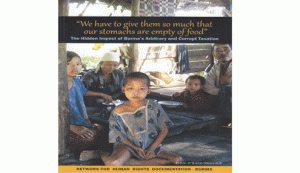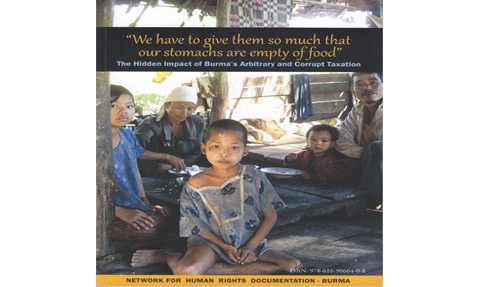 Om Soe : The Network for Human Rights Documentation – Burma (ND- Burma), has formally launched a groundbreaking report on the consequences of Burma’s corrupt taxation practices, during a press conference held today, September 1st, in Bangkok.
Om Soe : The Network for Human Rights Documentation – Burma (ND- Burma), has formally launched a groundbreaking report on the consequences of Burma’s corrupt taxation practices, during a press conference held today, September 1st, in Bangkok.
“We have to give them so much that our stomachs are empty of food: The Hidden Impact of Burma’s Arbitrary and Corrupt Taxation”, is compiled of 342 interviews given in 11 of Burma’s 14 states and divisions, the majority of which were compiled between 2008 and 2010. The report documents the occurrences of several types of arbitrary taxation throughout Burma collected by a variety of state actors, such as army battalions and village headmen.
According to Ms. Cheery Zahau, spokesperson for the English release of the report, data collection was frequently quite difficult for a variety of reasons. She told IMNA, “Firstly the security of the field workers, there are many places where they cannot go, because of the police control was to tight….another one is in terms of their ability to move, we have quite limited human resources, so those who are in the field have limited areas where they can go.”
“Hidden Impact” explores the damage that such taxation inflicts on Burma’s economy and population, and how the excessive and arbitrary taxation practices tolerated by the State Peace and Development Council (SPDC) violate a variety of international human rights laws. Excessive taxes are shown to draw Burmese citizens into endless spirals of debt, and leave villagers unable to secure their basic rights to adequate health, shelter, education, and sustainable livelihoods. “Hidden Impact” highlights that the corrupt and extreme taxation systems imposed by the SPDC are primarily a means of suppressing Burma’s population, rendering them unable to strive for much more than basic survival, let alone political change.
Ms. Zahau indicated that such repression seems unlikely to be halted by the developments of the upcoming 2010 elections.
“In one of the cases that we analyzed, one of the tax collecting agencies was the USDP, they used to be the USDA. Now they are the main party campaigning for the elections, so if these guys are still around in the new administration, their interest is not in how much people have to pay, and the problem will still remain… also, because there are so many soldiers within the army unless these soldiers are demobilized, there will still be the need to rely on the people. The soldiers will still be in control, and will still rely on the people. Unless political parties are allowed to freely talk about the taxation system, we don’t think that there will be a rapid change.”
The damage caused by agriculture-related taxes and crop seizure is of particular concerns to residents of Mon State, where the majority of the local economy is based on rice and rubber cultivation. Poor harvests from the 2009 rainy season sent many farmers into debt, stunting the Mon State economy.
A representative from the Human Rights Foundation of Monland (HURFOM), a member of the ND-Burma network, spoke to IMNA about his doubts as to whether Mon State’s economy is capable of recovery under Burma’s current taxation practices: “It [the Mon State economy] is getting worse and worse, I don’t think the economy will come back to the previous conditions. The economy and the farmers are affected by prices [of rice and other crops], and also by the weather. And the problems is that even before there was this kind of arbitrary taxation committed on civilians, so now [with the new economic conditions and previous taxations prices] there is no way [for the Mon State economy] to get better.”
“In order to change, the government must immediately stop, stop the extortion and taxing of people. We need both, international and external actors to change things. We are ruled by a dictatorship, and if the people do not protest [and only foreign intervention is used] the democratic change will not hold. But we need international actors as well,” he added.
ND- Burma, formed in 2003, is a multi ethnic network comprised of 13 different member organizations, all focused on Burma human rights documentation. The network provides these organizations with a means of sharing data and collaborating on documentation processes, with the goal of collectively using their shared information on the realities of life inside Burma to undermine the power of the Burmese regime through current-day advocacy measures, and to hold the Burmese junta accountable in the event of an eventual government transition.

